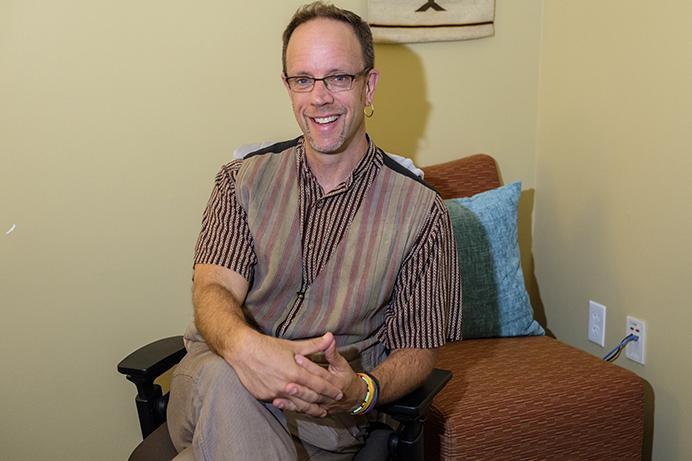Accessing resources for mental-health treatment on the University of Iowa campus has now become easier for students — the UI has extended its University Counseling Service offerings across campus to boost accessibility for students.
Through adding embedded counseling programs in residence halls and other select areas, as well as the addition of a second main Counseling Service location at the site of the old QuickCare location in the University Capitol Center, the UI has done just that. Those efforts were celebrated Thursday afternoon with an open house at the East Side location.
Former UI Student Government President Rachel Zuckerman and former Graduate and Professional Student Government Vice President Jasmine Mangrum proposed a $12.50 mental-health fee to the state Board of Regents in 2016 to fund additional counselors, which the regents later approved.
One of those staff additions included a second embedded counselor in the residence halls after the UI hired its first, Patrick Galligan, in 2016. Galligan said students have provided feedback saying the rollout of the embedded services has been effective and they enjoy the privacy of the services.
“Students will tell me one on one that ‘if this wasn’t here, I wouldn’t have sought help,’ ” he said. “ ‘Since this is here, I’ll seek services. I figured why not?’ That for me was a win just by itself.”
As for the second main location in the University Capitol Center, Barry Schreier, director of the Counseling Service, said the East Side location has offered more of an opportunity for same-day services.
RELATED: UI Counseling heads East
The extension of services is about having the counseling experience brought to students to normalize the idea of reaching out for treatment, said Lindsey Rayner, the UI Student Government chief of staff.
“It’s a lot faster, and it feels like a normalized experience just as if you were going to the Old Capitol mall for a Chipotle burrito,” she said.
Mirra Anson, the director of academic support and retention in the University College, said mental-health concerns are a top reason students are referred to the Early Intervention Team she co-directs. The team provides extra support to students who need it and may be struggling with finances, health problems, or other issues.
Additionally, students who withdraw from the UI are required to go to Anson’s office. After doing this for several years, she said students disclosed that mental-health concerns were a top reason students were withdrawing.
Because of the prevalence of mental-health concerns, she said, there has been more of a push to create partnerships across numerous areas of campus to connect students with resources they need to succeed.
“I think there’s definitely been a culture shift the past few years — how can we all work together to provide support for students, certainly referring them to [the Counseling Service], but what can we do in our own individual offices to make sure that we’re creating a more supportive environment,” she said.
Schreier said once students make use of the service, they are generally resilient and report feeling better after visiting a counseling location.



